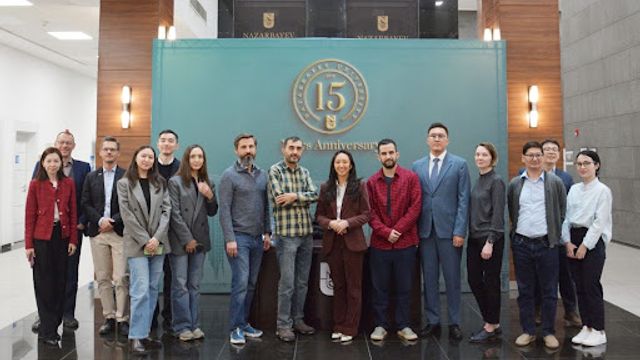Bridging Research, Policy, and Society for Water and Climate Solutions in Central Asia
On April 1, SDSN Kazakhstan hosted a roundtable discussion exploring the link between research, policy, and society in addressing water and climate challenges in Kazakhstan and Central Asia. The event brought together researchers from the Graduate School of Public Policy at Nazarbayev University (NU GSPP), Justus Liebig University (JLU), and Karaganda State University, as well as representatives from the World Bank, Food and Agriculture Organization (FAO), Deutsche Gesellschaft für Internationale Zusammenarbeit (GIZ), and Executive Committee of the International Fund for Saving the Aral Sea (EC IFAS), to discuss solutions to the region’s pressing socio-environmental challenges.
The roundtable highlighted the ongoing difficulty in finding effective solutions due to the persistence of traditional linear models of science-policy interaction, often coupled with limited societal engagement. While researchers continue to highlight critical climate risks and water security concerns, policymakers often focus on technocentric, infrastructure-based solutions. The central issue, as identified during the discussions, is not just bridging the research-policy gap but also integrating societal perspectives into this largely unexplored interface.
The event featured presentations from experts in the field. Dr. Aliya Assubayeva, Assistant Professor at NU GSPP, shared insights on water policy and governance research; Dr. Vadim Yapiyev from the NU National Laboratory, Astana, discussed water and climate research in Kazakhstan and Central Asia; and Dr. Björn Weeser, SDG Nexus Network project manager at JLU, explored the role of citizen science in these interfaces.
One of the standout questions from the roundtable was: “Who should be responsible for translating complex research into practical, actionable insights for policymakers and local communities?” This sparked a lively discussion, with many participants pointing to university-based think tanks as ideal candidates. These institutions are uniquely positioned to act as knowledge brokers, bridging the gap between science and society. By translating cutting-edge research into real-world solutions, especially in areas like water and climate governance, they can help ensure that sound science doesn't just stay in academic journals but shapes policy and practice on the ground.
The event hit the mark on its goals, sparking meaningful idea exchange, spotlighting key research gaps, and uncovering opportunities for collaboration among participants. Some of the key recommendations that emerged emphasized the importance of participatory research, integrating local knowledge in policy making, and investing in capacity building. There was also a strong emphasis on creating ongoing platforms where researchers, policymakers, and communities can come together, ensuring that conversations — and solutions — around sustainability continue well beyond the event.
To learn more about SDSN Kazakhstan, visit the Network’s website.
